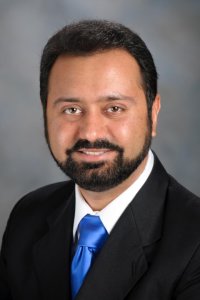Presented By: DCMB Seminar Series
DCMB / CCMB Weekly Seminar presents Rehan Akbani, PhD (Associate Professor, University of Texas, MD Anderson Cancer Center)
Talk Title: PanCancer “omics” landscape of the TP53 pathway across 33 TCGA tumor types

Abstract:
The TP53 tumor suppressor gene is frequently mutated in human cancers. We illustrate the “omics” landscape of the TP53 pathway across five data platforms in 10,225 patient samples from 33 cancers reported by The Cancer Genome Atlas (TCGA). More than 91% of TP53-mutant cancers exhibit second allele loss by mutation, chromosomal deletion, or copy-neutral loss of heterozygosity. TP53 mutations are associated with enhanced chromosomal instability, including increased amplification of oncogenes and deep deletion of tumor suppressor genes. Tumors with TP53 mutations differ from their non-mutated counterparts in RNA, miRNA, and protein expression patterns, with mutant TP53 tumors displaying enhanced expression of cell cycle progression genes and proteins. A mutant TP53 RNA expression signature shows significant correlation with reduced survival in 11 cancer types. Pathway activity scores were computed for all the samples using mRNA expression levels of ten TP53 pathway member genes. Gynecologic cancers show high activity of the pathway. The pathway is correlated with immune infiltration and EMT, and anti-correlated with RTK and RAS/MAPK pathways. In particular, a strong correlation with immune infiltration is observed in breast cancer. ATAC-seq data also show high chromatin accessibility of the pathway genes in breast cancer. Thus, the TP53 pathway has profound effects on tumor cell genomic structure, expression, and clinical outlook depending on tumor type.
Short Bio
Dr. Rehan Akbani is an Associate Professor at the University of Texas MD Anderson Cancer Center in Houston, Texas, in the Department of Bioinformatics and Computational Biology. He has worked at MD Anderson since 2009. He has played many leadership roles in major enterprises, including as PI on TCGA’s MD Anderson Genome Data Analysis Center (GDAC) grant. Within the TCGA consortium, he led four of TCGA’s analysis working groups and he’s been a co-author on each one of TCGA’s 33 marker papers and 27 pan-cancer papers since 2009. His primary contributions have been leading the analysis of proteomics data, and batch effects and quality control of omics data. He won the AACR “Team Science Award” in 2020 for his work in TCGA. He was conferred the “Highly Cited Researchers 2019” award by Web of Science for co-authoring the most highly cited papers in the past decade. He has over 87,700 citations and an h-index of 78 on Google Scholar. In 2014, he won the “Test of Time” award from the European Conference on Machine Learning (ECML) for publishing the most highly cited paper in ECML a decade ago. Currently, Dr. Akbani is the Co-Director of MD Anderson’s proteomics core and Co-Director of the metabolomics core, where he’s led the development of software pipelines for normalizing raw data and generating customer reports semi-automatically. He’s also contributed proteomics data analysis for projects including the Cancer Cell Line Encyclopedia (CCLE) and the MD Anderson Cell Line Project (MCLP).
Host: Veera Baladandayuthapani, Ph.D.
https://umich-health.zoom.us/j/93929606089?pwd=SHh6R1FOQm8xMThRemdxTEFMWWpVdz09
The TP53 tumor suppressor gene is frequently mutated in human cancers. We illustrate the “omics” landscape of the TP53 pathway across five data platforms in 10,225 patient samples from 33 cancers reported by The Cancer Genome Atlas (TCGA). More than 91% of TP53-mutant cancers exhibit second allele loss by mutation, chromosomal deletion, or copy-neutral loss of heterozygosity. TP53 mutations are associated with enhanced chromosomal instability, including increased amplification of oncogenes and deep deletion of tumor suppressor genes. Tumors with TP53 mutations differ from their non-mutated counterparts in RNA, miRNA, and protein expression patterns, with mutant TP53 tumors displaying enhanced expression of cell cycle progression genes and proteins. A mutant TP53 RNA expression signature shows significant correlation with reduced survival in 11 cancer types. Pathway activity scores were computed for all the samples using mRNA expression levels of ten TP53 pathway member genes. Gynecologic cancers show high activity of the pathway. The pathway is correlated with immune infiltration and EMT, and anti-correlated with RTK and RAS/MAPK pathways. In particular, a strong correlation with immune infiltration is observed in breast cancer. ATAC-seq data also show high chromatin accessibility of the pathway genes in breast cancer. Thus, the TP53 pathway has profound effects on tumor cell genomic structure, expression, and clinical outlook depending on tumor type.
Short Bio
Dr. Rehan Akbani is an Associate Professor at the University of Texas MD Anderson Cancer Center in Houston, Texas, in the Department of Bioinformatics and Computational Biology. He has worked at MD Anderson since 2009. He has played many leadership roles in major enterprises, including as PI on TCGA’s MD Anderson Genome Data Analysis Center (GDAC) grant. Within the TCGA consortium, he led four of TCGA’s analysis working groups and he’s been a co-author on each one of TCGA’s 33 marker papers and 27 pan-cancer papers since 2009. His primary contributions have been leading the analysis of proteomics data, and batch effects and quality control of omics data. He won the AACR “Team Science Award” in 2020 for his work in TCGA. He was conferred the “Highly Cited Researchers 2019” award by Web of Science for co-authoring the most highly cited papers in the past decade. He has over 87,700 citations and an h-index of 78 on Google Scholar. In 2014, he won the “Test of Time” award from the European Conference on Machine Learning (ECML) for publishing the most highly cited paper in ECML a decade ago. Currently, Dr. Akbani is the Co-Director of MD Anderson’s proteomics core and Co-Director of the metabolomics core, where he’s led the development of software pipelines for normalizing raw data and generating customer reports semi-automatically. He’s also contributed proteomics data analysis for projects including the Cancer Cell Line Encyclopedia (CCLE) and the MD Anderson Cell Line Project (MCLP).
Host: Veera Baladandayuthapani, Ph.D.
https://umich-health.zoom.us/j/93929606089?pwd=SHh6R1FOQm8xMThRemdxTEFMWWpVdz09